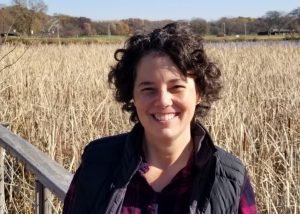
Siri Carpenter ’95 wrote down nearly every word Professor Patricia Devine said during an Introduction to Psychology course she signed up for to fulfill a breadth requirement, even that Professor Devine’s mother was “an intuitive psychologist.” Carpenter thought it was a subfield of psychology.
“[Devine] was the most dynamic and inspiring professor I had ever had,” Carpenter says. “I learned a lot in that class, but the day that we learned about the concept of unconscious prejudice and stereotyping was the day I decided to major in psychology.”
Near the end of her time at UW, Carpenter realized she also enjoyed writing but was unsure what writing professions existed. Carpenter went on to graduate school at Yale University to study social psychology.
“I very much enjoyed the work that I was doing in my graduate program, studying implicit bias,” Carpenter says. “[But for] as much as I loved science, I didn’t really feel like I wanted to spend my career studying and thinking about just one area of science.”
Then one Tuesday, she was reading The New York Times when the weekly Science Times section is published and discovered science journalism.
“I realized almost immediately that this is what I wanted to do,” Carpenter says.
Carpenter then did some research. She came across the American Association for the Advancement of Science’s Mass Media Fellowship program and got an internship working for the Richmond Times-Dispatch.
The next summer she interned at Science News magazine. Afterward, she finished her dissertation and got her first science writing job at the APA Monitor on Psychology. Two years later, she moved back to Madison and became a freelance science journalist and editor.
Early in her career, Carpenter wrote mainly about psychology and neuroscience. When she became an editor around 2012, her focus broadened. She edited stories on topics including psychology, medicine, biotechnology, earth science, climate, space, conservation, and paleontology.
Regardless of the topic, Carpenter finds her background in psychology has been relevant to science writing.
“Spending years learning about how human minds work turns out to be a great foundation for being an observer of science as a human enterprise,” Carpenter says.
Carpenter co-founded The Open Notebook, a nonprofit organization that helps science journalists improve their skills, in 2010.
Since then, The Open Notebook has published more than 500 articles on science writing, and in 2020, published its first book, The Craft of Science Writing. The nonprofit offers webinars, workshops, and free online skills courses and runs mentor programs for beginner science journalists in the U.S. and worldwide.
“We aim to be a resource for all science journalists all over the world, from the greenest newbies to the veterans who want to continue sharpening their craft,” Carpenter says.
Carpenter has also been a resource on the UW campus. She served as the Science Journalist in Residence for Fall 2013 and gave a public talk, met with students, and guest lectured in classes over the course of a week.
Carpenter finds her background in psychology has been especially relevant to considering issues in science journalism.
“Having studied implicit bias and spent all those years thinking about how biases that we aren’t always aware of affect our actions has been a very helpful grounding, especially in thinking about issues like whose voices get heard in science stories and what signals we journalists send about who science is for,” Carpenter says.
“When I was an undergrad, I don’t think I really appreciated that a degree in psychology could be so widely applicable and of value in so many different ways,” Carpenter says. “Only with time did I appreciate that although my work doesn’t require a degree in psychology, that background is absolutely relevant to what I do, day to day.”
Written by Sara Stanislawski